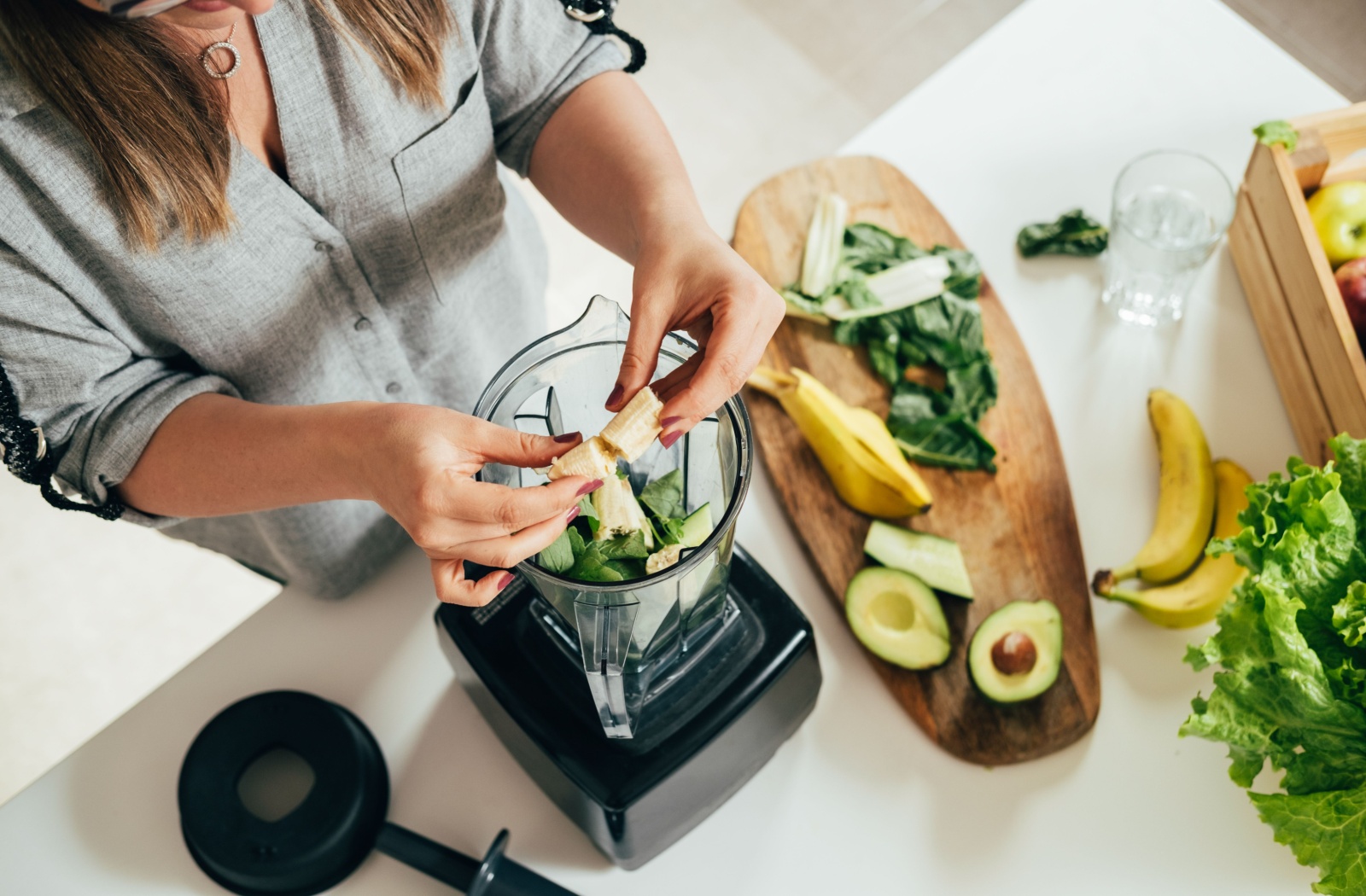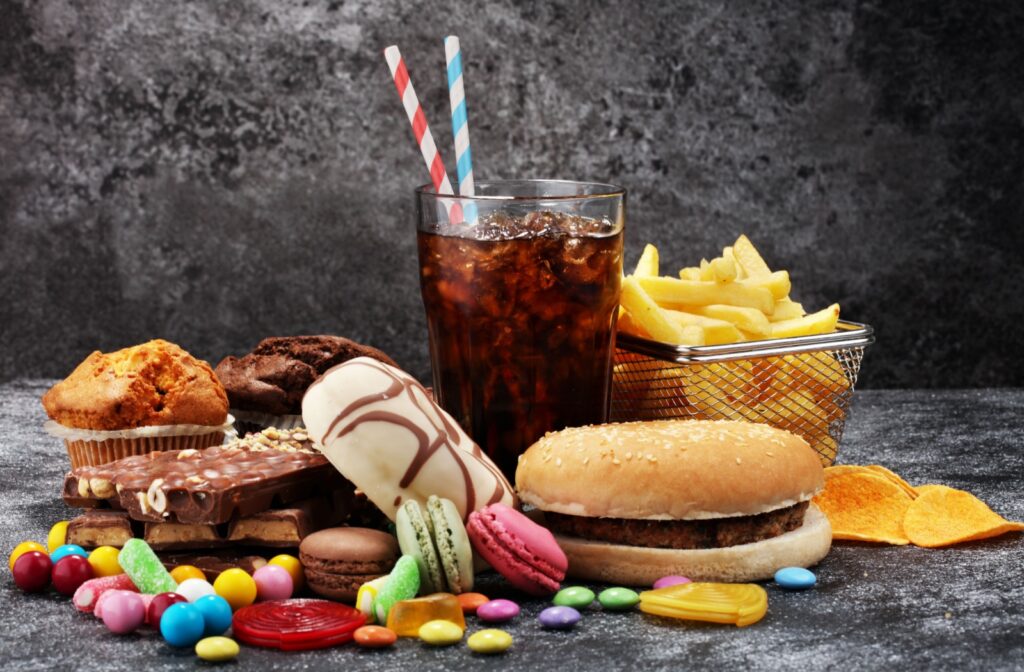When it comes to healthy vision, what you eat plays a bigger role than you might think. Although certain foods are tasty and convenient, they come at the expense of your vision and overall eye health.
Regularly consuming these “bad” foods deprives your eyes of the nourishment they need to properly function, and increases the risk of developing certain eye conditions:
- Sugary foods and drinks
- Fried foods
- Refined carbohydrates
- Processed foods
- Salty snacks
It’s important to foster a healthy relationship with food, rather than labeling foods as “good” or “bad” outright.
Occasionally enjoying a favorite salty snack or specialty latte won’t ruin your eye health, but adopting a balanced diet filled with nutrient-dense foods should be your overall goal!
The Worst Foods for Eye Health
Much to our dismay, some of our diets’ most popular (or convenient) foods can secretly wreak havoc on our eyes.
Before you reach for your next snack, it’s important to understand how certain foods may be doing more harm than good to your eye health. Let’s break down some of the top culprits you’ll want to watch out for.
Sugary Foods & Drinks
Excess sugar like candy, baked goods, soda, and even your beloved caramel macchiato can wreak havoc on your body, and your eyes are no exception.
High sugar intake drives up your blood sugar levels, which, over time, can damage the tiny blood vessels in your retina; a condition known as diabetic retinopathy.
High blood sugar can also increase pressure inside the eye, a hallmark sign of glaucoma. This condition damages the optic nerve and affects peripheral vision.
If you have diabetes, managing your sugar intake can help reduce the risk of developing diabetes-related vision concerns, but it doesn’t eliminate the risk entirely.
Even if you don’t have diabetes, a consistently high-sugar diet may cause your body to transform surplus sugar into fat. High blood sugar can cause the eye’s lens to swell, increasing the likelihood of developing cataracts which can cause cloudy or hazy vision.
Fried Foods
Fried chicken or golden onion rings can be tempting, but eating them often is never a good idea.
Fried foods are rich in unhealthy fats, which can clog arteries, limit blood flow to the eyes, and impair the function of your retina over time.
Besides, fried foods are often cooked at high temperatures. This can increase oxidative stress and inflammation, accelerating cell damage and aging of your eye cells, and heighten the risk of cataracts or macular degeneration.
Refined Carbohydrates
White bread, white rice, and other refined carbs may be convenient, but they’re bad news for your eyes. They lack essential nutrients and cause blood sugar levels to fluctuate dramatically.
These foods have a high glycemic index, meaning your body quickly breaks them down into sugar, causing your blood sugar levels to spike rapidly, much like sugary foods.
This “sugar rollercoaster” often leads to oxidative stress, which can weaken your retina and reduce its ability to function correctly, increasing your risk of eye diseases like glaucoma or macular degeneration or eye conditions linked to high-sugar like cataracts and diabetic retinopathy.

Processed Foods
Packed with preservatives, unhealthy fats, and loads of sodium, processed foods like instant noodles, frozen dinners, or packaged snacks often lack the nutrients your eyes need to stay healthy.
While they might taste tempting, these ingredients can raise your chances of developing heart-related issues, restricting blood flow and leading to inflammation. Less blood flow means less oxygen and fewer nutrients reaching your eyes, potentially accelerating conditions like macular degeneration.
In addition to these concerns, the artificial additives, colors, and preservatives used to prolong the shelf can also produce inflammatory responses in the body, contributing to chronic conditions like dry eyes.
Salty Snacks
Think pretzels, chips, or even some types of jerky. These tasty treats are loaded with sodium, which can lead to water retention and increased blood pressure.
Over time, high blood pressure can damage the delicate blood vessels in your eyes, reducing their functionality. Over time, this damage can lead to conditions such as hypertensive retinopathy.
High sodium diets are also associated with an increased risk of glaucoma, as they can alter fluid balance and pressure within the eye.
Foods to Support Eye Health
Now that we’ve looked at foods to avoid, let’s focus on the ones you should be eating often to keep your vision sharp and your eyes healthy.
Adding these power-packed options to your diet can help you feel more energized while supporting other areas of your health:
- Leafy greens: Dark greens like spinach, kale, and collard greens are rich in nutrients and antioxidants that lower the risk of developing cataracts and macular degeneration, and are an excellent source of vitamin C.
- Citrus fruits: Oranges, grapefruits, lemons, and limes are great sources of vitamin C. This antioxidant helps protect the eyes from free radicals and supports healthy blood vessels, reducing the risk of cataracts and AMD.
- Fatty fish: Salmon, mackerel, and sardines are loaded with omega-3 fatty acids, which support retinal health. They can also help reduce inflammation and combat dry eye syndrome.
- Nuts and seeds: Almonds, walnuts, chia seeds, and flaxseeds are great sources of vitamin E and omega-3s. Regular consumption can help slow down age-related vision concerns and promote overall eye health.
- Eggs: Egg yolks are another great source of antioxidants and zinc, which contribute to reducing the risk of macular degeneration. Plus, they’re versatile and easy to incorporate into any meal.
- Carrots: Packed with a certain type of vitamin A, carrots help prevent night blindness and support overall eye function.
- Sweet potatoes: These spuds are rich in vitamins A and E. Including them in your diet supports night vision and protects your eyes from free radical damage.
Foster a Holistic Approach to Eye Health
Adopting a mindful approach to a balanced diet with nutrient-rich foods means you can enjoy the occasional unhealthy snack without compromising your health.
Connect with our Eyes on Westlake team to learn how routine eye exams support healthy vision and eyes alongside a colorful, nourishing diet.





